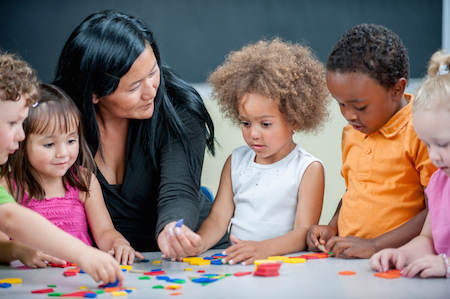
 |
 |
Aimee |
Katie |
Best Ages to Teach
Katie and Aimee, two English teachers, compare students by age and share which age they like to teach the most.
Aimee: So your favorite age group is the junior high school age.
Katie: Yeah.
Aimee: Do you have much experience teaching younger children?
Katie: Younger children like toddler age?
Aimee: Well, how about elementary school?
Katie: Yeah, elementary school. I've been teaching for about five years, five or six years. They're fine. You just have to be a bit silly with those kids.
Aimee: Yes.
Katie: Have a good time. Can't really be too serious when you're teaching young kids because they're still kids.
Aimee: That's true. So how about younger than that? How about the kindergarten age? How are they for you?
Katie: They're probably my Achilles heel. I'm not great with kindergarten students or younger than that because they don't respond to reason.
Aimee: Right.
Katie: Yeah. So they – I mean, yeah. They're difficult for me to teach. I prefer teaching older students.
How about you? What kind of age range do you like teaching?
Aimee: I think I appreciate all parts of all age groups. Every group has its pros and cons. Recently, I've been teaching university students, and I think I'm remembering how much I enjoy it because, you know, they are adults and you can teach them like adults. And you can still have a bit of silly, fun with them, too.
Katie: Yeah.
Aimee: So these days, I think I prefer teaching the older students, university age students. You can, you know, you can really go into topics quite deeply.
Katie: Yeah.
Aimee: And you can get some interesting answers from some students. Other students, of course, you can't.
Katie: Everyone is different, right?
Aimee: Yes. You just have to find a way of teasing, teasing their potential, of all of them, I think.
Katie: Is there a group that you don't like teaching?
Aimee: I'm not used to junior high school children, junior high school students. I don't have any experience with them. So that would make me nervous, I think.
Katie: How do you think they would be different to university students?
Aimee: I think, from what I mentioned before, the teenagers, the hormones. I think that would be different. There's, you know, it's bubbling inside them, all of these changes of feelings and emotions. And they have so many things to deal with; pressure of growing up. And I think that can be more challenging.
But I think it's important as a teacher to try to remember what it was like when you were that age.
Katie: Yeah.
Aimee: I think that's the biggest thing that will help you.
Katie: Absolutely. So what do you think about teaching younger children like babies? How are you with that?
Aimee: I do really enjoy that. Babies are awesome. They have their own set of needs. But usually, the very young classes come with, you know, the parents are there, too. So it's kind of a group-led situation, teacher-led group. And yeah, it's good fun for me. They're very cute and squishy. And very – not uncontrollable – what's the word?
Katie: Unpredictable?
Aimee: That's it. Completely unpredictable. You know, one day they can be in the best mood ever, and then the next day, they're just a nightmare.
Katie: I think that's why I'm terrified of them, because they're so unpredictable. I don't like it.
Aimee: Yeah. That's true. And the bodily functions too, you know.
Katie: Yeah, no thanks.
Aimee: There's all of that.
Katie: Yeah. I'm not prepared to deal with that. No, thank you. No, thank you. No bodily functions.
silly

You just have to be a bit silly with those kids.
If you are silly, you are not serious and you are being very playful. Notice the following:
- He always acts so silly.
- Stop acting silly and pay attention.
Achilles heel

They're probably my Achilles heel.
An Achilles heel is a weakness or weak point that can cause people to fail or do poorly. The chillies tendon connects the heel of the foot to the leg. Notice the following:
- His temper is his Achilles heel.
- He tore his Achilles playing football.
pros and cons

Every group has its pros and cons.
Pros and cons are good and bad points about something. Pros are good points. Cons are bad points. Notice the following:
- What are the pros and cons of doing business?
- I know the pros. What are the cons?
hormones

Teenagers deal with hormones.
Hormones are chemicals in our bodies that influence how we think and act. Teens go through lots of hormonal changes. Notice the following:
- Teenagers are full of hormones.
- Hormones affect us all.
bubbling inside

It's bubbling inside them
If something is bubbling inside, that means energy or activity is coming from within that wants to flow out. Notice the following:
- I have all these emotions bubbling inside me.
- The kids have lots of energy bubbling inside themselves.
a nightmare

They're just a nightmare.
A nightmare is a bad dream or a scary dream, but here it means a bad sitation. Notice the following:
- Traffic is a nightmare today.
- My day has been a nightmare so far!
Vocabulary Quiz
Use the words below to complete the sentences.
hormones • bubbling • nightmare

















